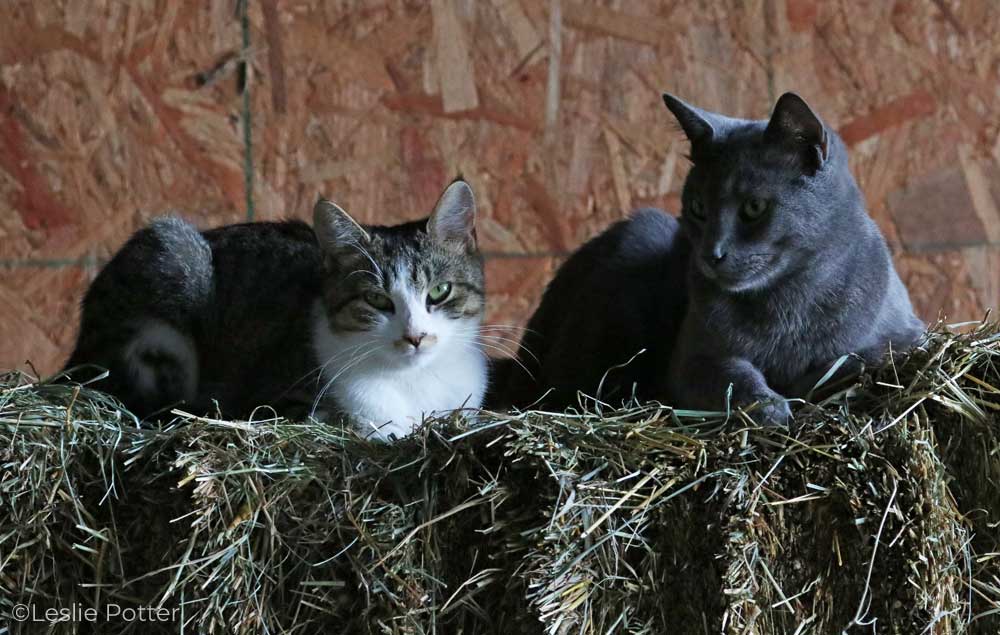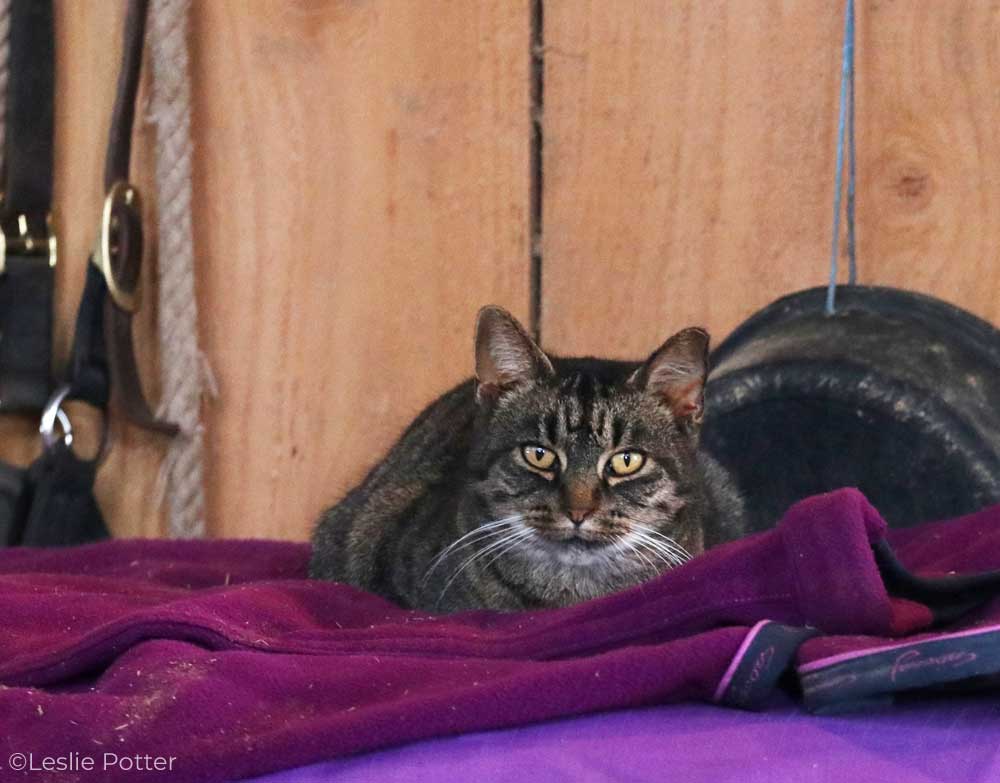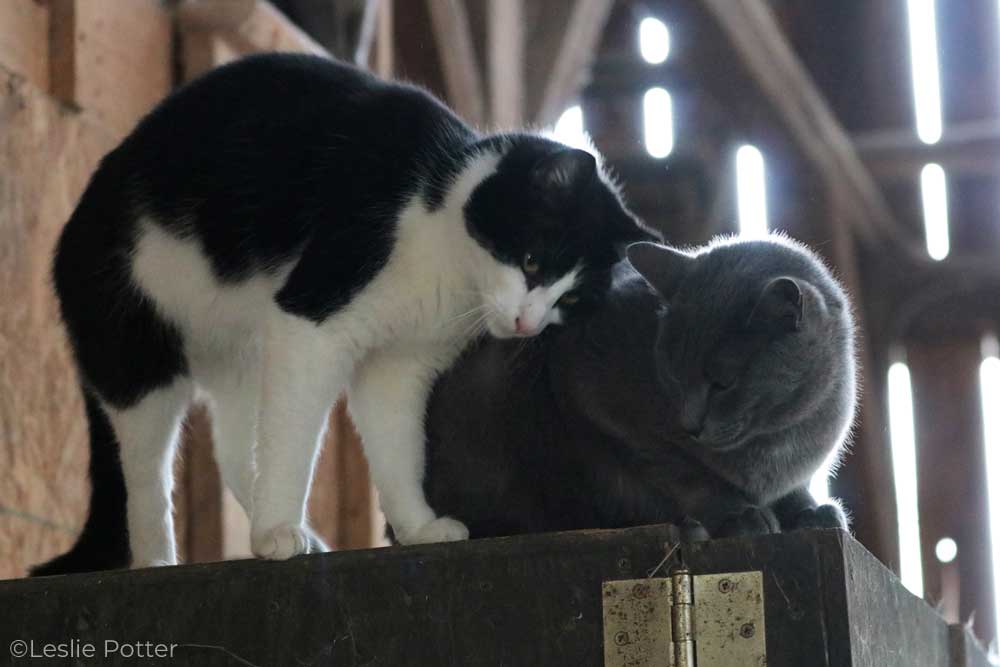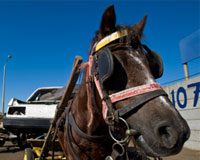Barn cats can make your farm feel complete. They usually spend their days hunting and patrolling the environment in and around the barn. After a long day of rodent hunting, these working cats tend to lean on their owners to provide them with food, water and a safe place to recharge.

It’s important to determine if your cat is actually cut out for the barn cat life or if they should head indoors for a housecat retirement. By evaluating your feline friend’s health and behavior, you’ll have a pretty good idea of where your cat should live.
Consider Your Cat’s Personality Traits
Usually, cats who end up as barn cats are either feral or wild strays.
“Feral cats are truly a wild animal and are born to be an outdoor cat,” says Sandra C. Mitchell, DVM, DABVP, owner of All Creatures Veterinary Services in Bangor, Maine. “On the other hand, wild strays may be familiar with people and handling but can become stressed by too much contact and may panic at the sight of a closed door.”
Some cats also might show up at your barn and be extremely friendly right off the bat. In those cases, Dr. Mitchell recommends scanning the cat for a microchip at her first veterinary visit. This will help determine if the cat is lost and has a loving parent looking for her.
While each cat is unique, Dr. Mitchell provides some general traits to consider when determining if your cat is meant to be indoors.
Common Traits of Indoor Cats
- Social
- Craves attention and interaction
- Likes to play with people and other cats
- Treat motivated
- Comfortable with handling
Common Traits of Barn Cats
- Does not enjoy spending time with people
- Not social; prefers to avoid other cats and animals
- Rodent hunter
- Difficult to handle/prefers to not be touched
- Stressed by captivity/closed doors
Use this as a helpful guide to determine barn cat behavior traits, but remember, there are exceptions to every rule. In the end, it comes down to what makes your individual cat happy.

Evaluate Your Cat’s Health
Cat health care is extremely important, and there are several health issues that might preclude your pets from being barn cats. With certain illnesses, you’ll want to convert your feline from the outdoor life to the indoors for good.
“The big ones that cats should not be allowed out with are Feline Leukemia [FeLV] and Feline Immunodeficiency Virus [FIV],” Dr. Mitchell says.
Both conditions are transmittable and can affect other cats in the area. Dr. Mitchell recommends getting your working cats tested for both of these illnesses every year. If any of your barn cats end up contracting either condition, immediately transition her to an indoor-only cat.
Other health issues that need regular medical attention and would require your cat to stay indoors are:
- Conditions that require medications on a schedule. Examples are diabetes, hyperthyroidism and cancer.
- Kidney disease and other conditions that can worsen from heat or cold stress.
- Heart disease and other health problems that can change rapidly.
Even if your barn cat’s health is excellent, Dr. Mitchell recommends staying on top of preventative care just as you would for an indoor cat.
“To have healthy barn cats, these animals should be spayed/neutered, receive all of their vaccines and receive monthly anti-parasite drops,” she says, adding that “sending a cat outdoors does not mean the owner is not still responsible for good health care. Cats that are put out to work in the barn need as much [if not] more care than the average house cat.”
Since barn cats are exposed to a lot outdoors—from predators to illness to injury—they may have a higher risk of illness and parasites.

Transitioning Your Barn Cat to the Indoors
Have you decided to move your barn cat indoors as your new roomie? If so, Dr. Mitchell says “cold turkey” is the best way to convert an outdoor cat to a house cat, especially if she has a contagious disease like FeLV.
Another option is to wait until the winter to convert your barn cat to an indoor-only cat, because cats don’t mind staying in to keep warm. Yet another way is to gradually work on keeping her indoors. In this instance, you would allow your cat to spend her days outdoors but bring her in at night. Extend the duration you keep her inside until you’ve fully transitioned her from an outdoor cat to an indoor cat.
“There is no perfect way [to transition a barn cat inside],” Dr. Mitchell says. “And, no, it isn’t always a smooth transition…it just takes fortitude to know you are making the best decision for your cat.”
It all comes down to your cat and her current situation. You can speak with your veterinarian to help decide on the best way to transition your cat.
If you want your newly indoor cat to still enjoy all the outdoors offers, consider transforming your patio into an enclosed catio for your cat. You also can get cat supplies to help your cat safely enjoy nature, like a cat window perch from which to view the outdoors or a cat stroller for walks around the neighborhood. And if your cat isn’t suffering from a contagious illness, you can try walking her on a leash and harness for outdoor adventures.
Caring for Your Barn Cats
If your barn cat fits the outdoor lifestyle she’s been living, take a minute to evaluate how you’ve been caring for her. She needs provisions for a warm and dry place to sleep, a safe shelter, thawed water and accessibility to cat food.
Make sure you have the necessary cat supplies, such as cat litter boxes, food bowls and cat beds, to provide your barn cat with a comfortable, safe place to come “home” to when she’s not out working. The more spoiled your barn kitty is, the happier she will be, Dr. Mitchell adds.
Keep potentially hazardous horse supplies and other farm items out of your cat’s reach.
“I’ve seen cats poisoned—sometimes fatally—by ingesting some of the very concentrated medications [that are] designed for large animals,” Dr. Mitchell says.
Prevent this by keeping medications indoors or in an enclosed area your cat cannot access.
Whether your pets are barn cats or house cats, the best thing to do is to pay attention to their behavior and be proactive about their health. This will enable you to determine the most suitable lifestyle for your feline companions.





